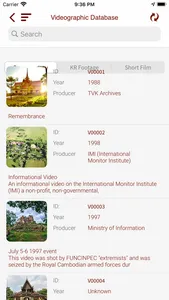The Documentation Center of Cambodia (DC-Cam) was founded by Yale University and constituted in 1995 after the U.S. Congress passed the Cambodian Genocide Justice Act in April 1994, which was signed into law by President Clinton.
The Center is a non-profit, non-governmental, a political Cambodian research institute dedicated to documenting the history of the Democratic Kampuchea (DK) regime of Pol Pot (1975-1979).
DC-Cam has two main objectives:
The first is to record and preserve the history of the DK regime for future generations.
The second is to assemble historical documents and related materials that serve as potential evidentiary information in support of those who seek accountability for the crimes of the Khmer Rouge (KR).
Being the world’s largest repository of original KR documents, DC-Cam has taken a lead role in supplying the Extraordinary Chambers in the Courts of Cambodia (ECCC) with half a million copies of evidentiary documents and testimonial accounts of survivors of the Khmer Rouge era from its vast archive.
DC-Cam also provides digital access to its archive to officials, scholars, and the general public in an impartial manner. DC-Cam is guided in all of its efforts by the principles that inhere in the concepts of memory and justice. They serve as the foundation for establishing the rule of law and achieving a genuine national reconciliation.
The Royal Government of Cambodia also formally supported DC-Cam. DC-Cam has received numerous accolades and awards for its work in support of memory and justice for victims of the Cambodian genocide.
In 2017 alone, DC-Cam was the honored recipients of the Judith Lee Stronach Human Rights Award from the Center for Justice and Accountability, and his Majesty King Norodom Sihamoni made Youk Chhang a Commander of the Royal Order of Cambodia in recognition of Chhang’s distinguished services to the Kingdom of Cambodia.
In 2018, DC-Cam also was a winner of the Ramon Magsaysay Awards, which is regarded as ‘Asia’s Nobel’ prize, for preserving historical memory for healing and justice.
The Center is a non-profit, non-governmental, a political Cambodian research institute dedicated to documenting the history of the Democratic Kampuchea (DK) regime of Pol Pot (1975-1979).
DC-Cam has two main objectives:
The first is to record and preserve the history of the DK regime for future generations.
The second is to assemble historical documents and related materials that serve as potential evidentiary information in support of those who seek accountability for the crimes of the Khmer Rouge (KR).
Being the world’s largest repository of original KR documents, DC-Cam has taken a lead role in supplying the Extraordinary Chambers in the Courts of Cambodia (ECCC) with half a million copies of evidentiary documents and testimonial accounts of survivors of the Khmer Rouge era from its vast archive.
DC-Cam also provides digital access to its archive to officials, scholars, and the general public in an impartial manner. DC-Cam is guided in all of its efforts by the principles that inhere in the concepts of memory and justice. They serve as the foundation for establishing the rule of law and achieving a genuine national reconciliation.
The Royal Government of Cambodia also formally supported DC-Cam. DC-Cam has received numerous accolades and awards for its work in support of memory and justice for victims of the Cambodian genocide.
In 2017 alone, DC-Cam was the honored recipients of the Judith Lee Stronach Human Rights Award from the Center for Justice and Accountability, and his Majesty King Norodom Sihamoni made Youk Chhang a Commander of the Royal Order of Cambodia in recognition of Chhang’s distinguished services to the Kingdom of Cambodia.
In 2018, DC-Cam also was a winner of the Ramon Magsaysay Awards, which is regarded as ‘Asia’s Nobel’ prize, for preserving historical memory for healing and justice.
Show More









